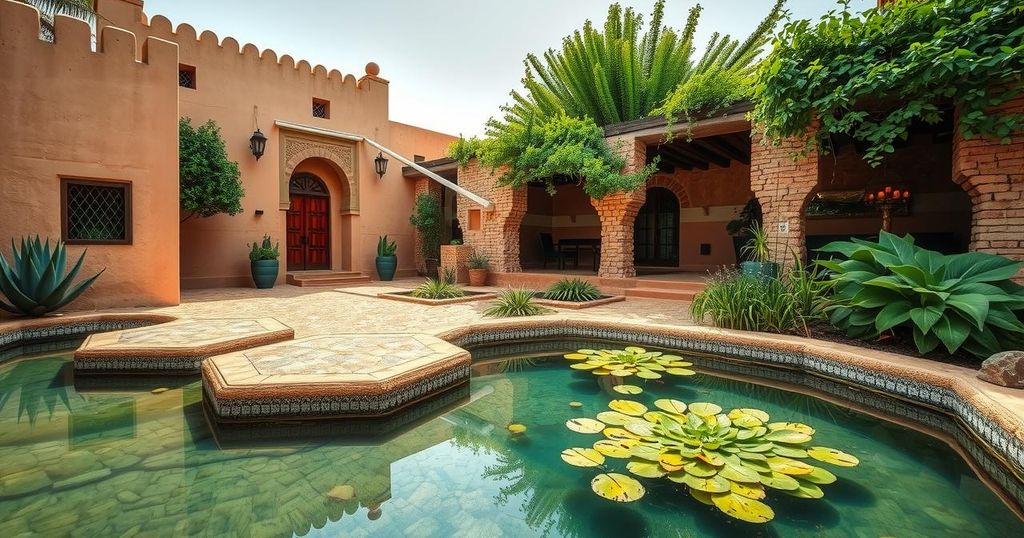Climate change
AFRICA, AGADIR, AMAZI, BLUE SAFARI, CLIMATE CHANGE, CULTURAL HERITAGE, EUROPE, FRANCE, GREATER, GREATER AGADIR, IMSOUANE, KINGDOM OF MOROCCO, LA RELÈVE ET LA PESTE, LA RELEVE ET LA PESTE, MARGHADI, MINISTRY FOR ECOLOGICAL TRANSITION, MINISTRY OF TOURISM, MOROCCO, PARK, SAID MARGHADI, SI, SIHAM AZEROUAL, SOUSS MASSA, SOUSS MASSA NATIONAL PARK, TI, TIFNIT, TOURISM
Isaac Bennett
0 Comments
As Tourism Soars in Morocco, Calls for Responsibility Increase
Morocco’s tourism is booming with 17.4 million visitors in 2024, generating significant revenue. However, this growth raises serious concerns for local communities and the environment. Rapid development has led to the demolition of villages, sparking a push for responsible tourism as a sustainable alternative to the current trends that could threaten local identities and ecosystems.
Morocco has emerged as a hot tourist destination, attracting a record 17.4 million visitors in 2024. This accomplishment comes two years sooner than the 2026 goal set by the Ministry of Tourism. The influx has significantly bolstered the national economy, generating 112.5 billion dirhams in revenue, marking a 7.5% increase from last year. While tourism now supports 827,000 jobs and added 25,000 new positions over the past year, there are increasing concerns about the ramifications of this rapid growth on local communities and the environment.
Recent developments tell a troubling story. Coastal villages, some with strong Amazigh (Berber) ties, have been torn down to make way for luxury resorts. Residents of Tifnit received only five days to evacuate, while Imsouane, a haven for surfers and fishermen, witnessed bulldozers razing homes overnight, leaving 1,000 people displaced. Journalist Siham Azeroual pointed out that such evictions strike at the heart of Amazigh identity and heritage: “When the state takes away their land, it strikes at one of the core pillars of Amazigh identity: living on and from their land”.
The rapid tourism expansion reflects Greater Agadir’s ambition, planning fifteen new tourist zones and an expansive “Blue Safari” route to connect Agadir with sites in Souss Massa National Park. This has tourism entrepreneur Said Marghadi worried, who stresses the cost of an obsession with numbers, saying, “What’s the point of increasing arrivals if the money doesn’t benefit the regions in a sustainable way?”
Environmental issues are alarming as well. Mass tourism worldwide contributes nearly 5% of greenhouse gas emissions, a statistic echoed by France’s Ministry for Ecological Transition. Regions of Morocco already face climate challenges with declining reservoirs and harvests. Notably, hotels often run air conditioning non-stop, even in unoccupied rooms, as rural communities grapple with water shortages. Marghadi lamented the reckless inconsistency in policy, stating, “And still, we keep building five-star hotels as far as the eye can see.” His verdict is stark: “Mass tourism accelerates climate change.”
In light of such challenges, a movement for responsible tourism is on the rise. Defined by the UN World Tourism Organization, responsible tourism accounts for its current and future economic, social, and environmental impacts. Marghadi’s own venture, established in 2008, exemplifies this ethos. His ecolodge was crafted with traditional local materials and solar energy, striving for sustainability beyond mere infrastructure. “Responsible tourism isn’t a checklist—it’s about coherence between the environment, the social responsibility of the accommodation, the food, and the team,” he stated, highlighting the need for genuine integration.
His commitment to forging connections with visitors is notable. Rather than a passive experience, guests are encouraged to play an active role—whether picking fruits or cooking with local produce. He believes that empowering them to partake in their journey enhances their understanding. “A tourist who has an authentic experience becomes a far more powerful ambassador than any advertising campaign,” he noted, advocating for a style of education that is gentle and experiential.
Marghadi’s commitment does not stop at guests; he sees the importance in educating his staff about environmental issues too. He encourages them to learn from international perspectives, as demonstrated by a team member who visited ecological farms in France. He shared an example, saying, “A taxi driver we work with started his own vegetable garden after we taught him how to plant seeds.”
Nevertheless, the road to responsible tourism in Morocco is not without challenges. Marghadi expressed frustration about the absence of a standardized label for ecolodges, indicating that this could mislead consumers, undermining genuine initiatives. Despite these hurdles, he remains optimistic. “Being ecological is simple. No miracles needed. Just organization, discipline, and respect,” he emphasized, advocating for gradual yet meaningful change. He believes in the ripple effect of individual contributions, suggesting, “If I reach one, and they reach another… then we begin to change things.”
Tourism in Morocco is experiencing an unprecedented boom, achieving record visitor numbers and boosting the economy significantly. However, this rapid growth is raising critical questions about sustainability, local community impact, and environmental consequences. Voices like Said Marghadi’s highlight a pathway towards responsible tourism as a solution, with emphasis on long-term benefits over immediate economic gains. As tourism continues to evolve, finding a balance between growth and responsibility will be essential for a sustainable future in Morocco.
Original Source: en.yabiladi.com




Post Comment